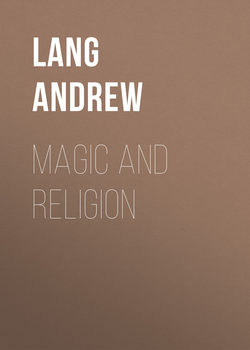Magic and Religion

Реклама. ООО «ЛитРес», ИНН: 7719571260.
Оглавление
Lang Andrew. Magic and Religion
I. SCIENCE AND SUPERSTITION
II. THE THEORY OF LOAN-GODS; OR BORROWED RELIGION
III. MAGIC AND RELIGION
IV. THE ORIGIN OF THE CHRISTIAN FAITH
V. THE APPROACHES TO MR. FRAZER'S THEORY
I. THE EVOLUTION OF GODS
II. THE ALLEGED MORTALITY OF GODS
III. RELIGIOUS REGICIDE
IV. ANNUAL RELIGIOUS REGICIDE
V. THE SATURNALIA
VI. THE GREEK CRONIA
VII. THE SACÆA
VI. ATTEMPTS TO PROVE THE SACÆAN CRIMINAL DIVINE
I. SACRIFICE BY HANGING. DOES IT EXIST?
II. STAGES IN MR. FRAZER'S THEORY
III. A POSSIBLE RECONCILIATION
IV. THE SACÆA SUDDENLY CHANGES ITS DATE
V. VARIOUS THEORIES OF THE VICTIM
VII. ZAKMUK, SACÆA, AND PURIM
I. HISTORICAL DIFFICULTY
II. PERSIANS ARE NOT BABYLONIANS
III. ORIGIN OF PURIM
IV. IS PURIM PRE-EXILIAN OR POST-EXILIAN?
V. THEORY OF A HUMAN VICTIM AT PURIM
VI. CONTRADICTORY CONJECTURE
VII. A NEW THEORY OF THE VICTIM
VIII. NEW GERMAN THEORY OF PURIM
IX. ANOTHER NEW THEORY. HUMMAN AND THE VICTIM
VIII. MORDECAI, ESTHER, VASHTI, AND HAMAN
I. ESTHER LOVED BY MORDECAI
II. THE PERSIAN BUFFOON
III. A HELPFUL THEORY OF MY OWN
IX. WHY WAS THE MOCK-KING OF THE SACÆA WHIPPED AND HANGED?
I. PERIODS OF LICENCE
II. THE DIVINE SCAPEGOAT
III. MORE PERIODS OF LICENCE
IV. THE SACÆA AS A PERIOD OF LICENCE
X. CALVARY
XI. THE GHASTLY PRIEST
XII. SOUTH AFRICAN RELIGION
XIII 'CUP AND RING:' AN OLD PROBLEM SOLVED
XIV. FIRST-FRUITS AND TABOOS
XV. WALKING THROUGH FIRE
APPENDIX A. MR. TYLOR'S THEORY OF BORROWING
APPENDIX B. THE MARTYRDOM OF DASIUS
APPENDIX C. THE RIDE OF THE BEARDLESS ONE
Отрывок из книги
We all know what we mean by science; science is 'organised common sense.' Her aim is the acquisition of reasoned and orderly knowledge. Presented with a collection of verified facts, it is the part of science to reduce them to order, and to account for their existence in accordance with her recognised theory of things. If the facts cannot be fitted into the theory, it must be expanded or altered; for we must admit that, if the facts are verified, there is need for change and expansion in the theory. The 'colligation' of facts demands hypotheses, and these may not, at the moment of their construction, be verifiable. The deflections of a planet from its apparently normal course may be accounted for by the hypothesis of the attraction of another heavenly body not yet discovered. The hypothesis is legitimate, for such bodies are known to exist, and to produce such effects. When the body is discovered, the hypothesis becomes a certainty. On the other hand, the hypothesis that some capricious and conscious agency pushed the planet into deflections would be illegitimate, for the existence of such a freakish agency is not demonstrated. Our hypotheses then must be consistent with our actual knowledge of nature and of human nature, and our conjectured causes must be adequate to the production of the effects. Thus, science gradually acquires and organises new regions of knowledge.
Superstition is a word of much less definite meaning. When we call a man 'superstitious,' we usually mean that evidence which satisfies him does not satisfy us. We see examples daily of the dependence of belief on bias. One man believes a story about cruelties committed by our adversaries; another, disbelieving the tale, credits a narrative about the misconduct of our own party. Probably the evidence in neither case would satisfy the historian, or be accepted by a jury. A man in a tavern tells another how the Boers, retreating from a position, buried their own wounded. 'I don't believe that,' says the other. 'Then you are a pro-Boer.'
.....
Like other martyrs of science, I must expect to be thought importunate, tedious, a fellow of one idea, and that idea wrong. To resent this would show great want of humour, and a plentiful lack of knowledge of human nature. Meanwhile, I am about to permit myself to criticise some recent hypotheses in the field of religious origins, in the interests of anthropology, not of orthodoxy.
The 'Christian' idea is, naturally, that of the old man of Blake and Michael Angelo – Hartley Coleridge's 'old man with the beard.' Is it likely that the savages had seen any such representations? Again, is the idea of Baiame as an old man not natural to a race where respect of age is regularly inculcated in the mysteries and prevails in practice? 'Among the Kamilaroi about Bundurra, Turramulan [another name for this or a lower god] is represented [at the mysteries] by an old man learned in all the laws.'29…
.....